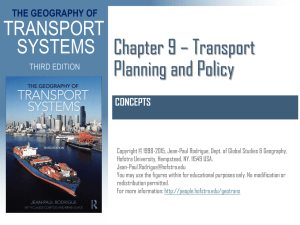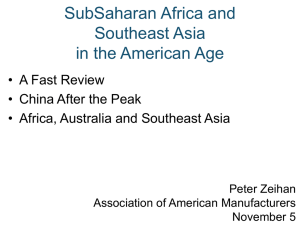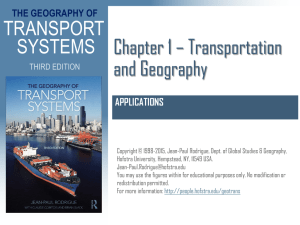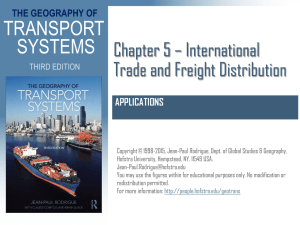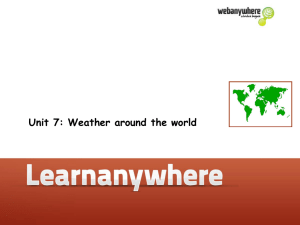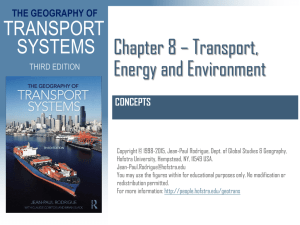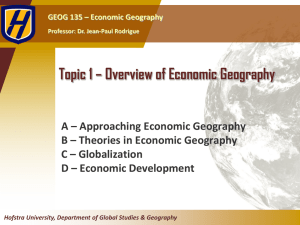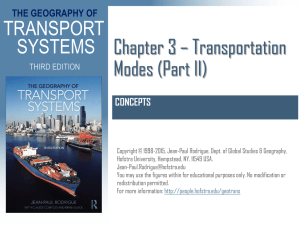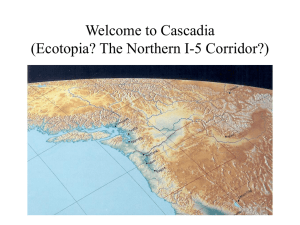Chapter 4 - Transport Terminals
advertisement
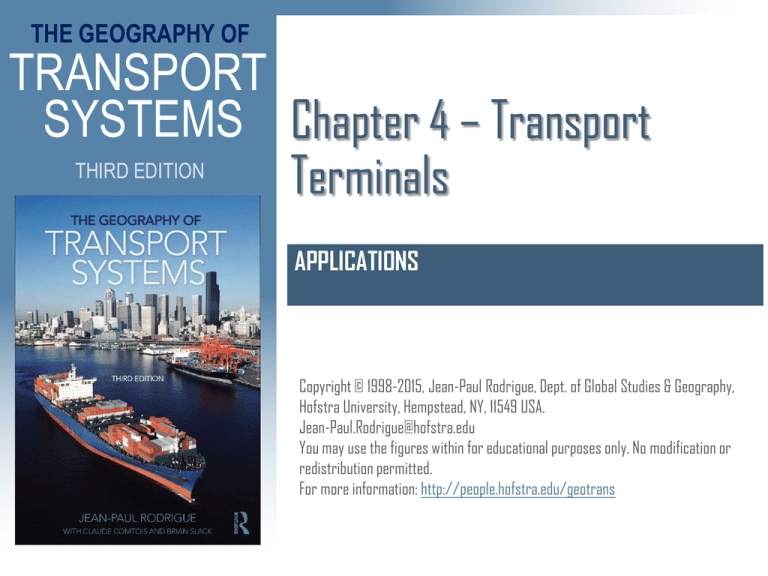
THE GEOGRAPHY OF TRANSPORT SYSTEMS Chapter 4 – Transport THIRD EDITION Terminals APPLICATIONS Copyright © 1998-2015, Jean-Paul Rodrigue, Dept. of Global Studies & Geography, Hofstra University, Hempstead, NY, 11549 USA. Jean-Paul.Rodrigue@hofstra.edu You may use the figures within for educational purposes only. No modification or redistribution permitted. For more information: http://people.hofstra.edu/geotrans Usage Conditions • DO NOT COPY, TRANSLATE OR REDISTRIBUTE THIS DOCUMENT. • The contents of this document can be freely used for personal or classroom use ONLY. • Although the material contained in this document is freely available, it is not public domain. Its contents, in whole or in part (including graphics and datasets), cannot be copied and published in ANY form (printed or electronic) without consent. • If you have accessed this document through a third party (such as a content farm), keep in mind that this party is illegally redistributing this content. Please refer to the true source (http://people.hofstra.edu/geotrans) instead of the third party. • Permission to use any graphic material herein in any form of publication, such as an article, a book or a conference presentation, on any media must be requested prior to use. • Information cited from this document should be referred as: Rodrigue, J-P et al. (2013) The Geography of Transport Systems, Hofstra University, Department of Global Studies & Geography, http://people.hofstra.edu/geotrans. Copyright © 1998-2015, Dr. Jean-Paul Rodrigue, Dept. of Global Studies & Geography, Hofstra University. For personal or classroom use ONLY. This material (including graphics) is not public domain and cannot be published, in whole or in part, in ANY form (printed or electronic) and on any media without consent. This includes conference presentations. Permission MUST be requested prior to use. THE GEOGRAPHY OF TRANSPORT SYSTEMS Mega Airport Projects THIRD EDITION Application 1 Copyright © 1998-2015, Dr. Jean-Paul Rodrigue, Dept. of Global Studies & Geography, Hofstra University. For personal or classroom use ONLY. This material (including graphics) is not public domain and cannot be published, in whole or in part, in ANY form (printed or electronic) and on any media without consent. This includes conference presentations. Permission MUST be requested prior to use. Location of the Dallas / Fort Worth Airport £ ¤ 75 § ¦¨ 35 £ ¤ 81 DFW § ¦¨ § ¦¨ ¨¦§ ¨¦ § ¨¦ § 635 35 635 § ¦¨ 635 35 § ¦¨ ¨§ ¦ ¨¦ § V § U ¨¦ ¨¦ U § V £ ¤ ¨¦ § ¨¦ § £ ¤ Worth ¨¦ § 35 820 820 199 ¨¦ ¨§ ¦ § ¨¦ ¨¦ § § 30 30 20 820 Fort 180 V U 820 287 80 45 V U ¨¦ § Dallas § ¦¨ 20 310 20 § ¦¨ § ¦¨ 20 35 £ ¤ § ¦¨ 180 287 30 78 35 30 § ¦¨ V U 35 45 35 £ ¤ £ ¤ 67 175 § ¦¨ 45 10 5 0 10 Miles Copyright © 1998-2015, Dr. Jean-Paul Rodrigue, Dept. of Global Studies & Geography, Hofstra University. For personal or classroom use ONLY. This material (including graphics) is not public domain and cannot be published, in whole or in part, in ANY form (printed or electronic) and on any media without consent. This includes conference presentations. Permission MUST be requested prior to use. 1,200 60 1,000 Passengers 50 Thousands 70 800 40 600 Cargo Millions Passengers and Freight Traffic, DFW, 1982-2013 30 400 20 200 10 0 0 Passengers Cargo (in tons) Copyright © 1998-2015, Dr. Jean-Paul Rodrigue, Dept. of Global Studies & Geography, Hofstra University. For personal or classroom use ONLY. This material (including graphics) is not public domain and cannot be published, in whole or in part, in ANY form (printed or electronic) and on any media without consent. This includes conference presentations. Permission MUST be requested prior to use. Configuration of Dallas / Fort Worth Airport REDO MAP USING A GOOGLE EARTH BACKGROUND Terminal 2W N Fort Worth Hotel Highway Toll Parking Toll Dallas Terminal 4E Terminal 3E Terminal 2E Copyright © 1998-2015, Dr. Jean-Paul Rodrigue, Dept. of Global Studies & Geography, Hofstra University. For personal or classroom use ONLY. This material (including graphics) is not public domain and cannot be published, in whole or in part, in ANY form (printed or electronic) and on any media without consent. This includes conference presentations. Permission MUST be requested prior to use. THE GEOGRAPHY OF TRANSPORT SYSTEMS The Port Authority of New York and New Jersey THIRD EDITION Application 2 Copyright © 1998-2015, Dr. Jean-Paul Rodrigue, Dept. of Global Studies & Geography, Hofstra University. For personal or classroom use ONLY. This material (including graphics) is not public domain and cannot be published, in whole or in part, in ANY form (printed or electronic) and on any media without consent. This includes conference presentations. Permission MUST be requested prior to use. Copyright © 1998-2015, Dr. Jean-Paul Rodrigue, Dept. of Global Studies & Geography, Hofstra University. For personal or classroom use ONLY. This material (including graphics) is not public domain and cannot be published, in whole or in part, in ANY form (printed or electronic) and on any media without consent. This includes conference presentations. Permission MUST be requested prior to use. Major Planning Agencies Involved in the New York Metropolitan Area Agency Jurisdiction New York Metropolitan Transportation Council Type Functions New York City and 5 counties in NY MPO Plan, coordinate North Jersey Transportation Planning Authority 13 counties in New Jersey MPO Plan, coordinate New York State Department of Transportation State of New York State highways and traffic control systems DOT Plan, build, maintain New Jersey Department of Transportation State of New Jersey State highways and traffic control systems DOT Plan, build, maintain New York City Department of Transportation City of New York Local streets, arterials, traffic control DOT systems Plan, build, maintain Port Authority of New York and New Port district in NY and NJ Jersey Marine terminals, bridges, tunnels, airports, transit system Special purpose Plan, build, operate, maintain, issue debt, toll, collect rent Metropolitan Transportation Authority New York City and 7 counties in NY Buses, subways, commuter lines, bridges, tunnels Special purpose Plan, build, operate, maintain, issue debt, toll, collect rent New York City Economic Development Corporation New York City Marine terminals Special purpose Plan, operate, maintain Federal Agencies: USDOT, FHWA, FTA United States Modes Oversight, regulate Copyright © 1998-2015, Dr. Jean-Paul Rodrigue, Dept. of Global Studies & Geography, Hofstra University. For personal or classroom use ONLY. This material (including graphics) is not public domain and cannot be published, in whole or in part, in ANY form (printed or electronic) and on any media without consent. This includes conference presentations. Permission MUST be requested prior to use. Financial Profile of the New York – New Jersey Port Authority, 2003 Gross Operating Revenues ($2.76 billion) 5% Assets ($11.4 billion) 5% 3% 29% 32% Interstate Transportation Network Air Terminals Port Commerce World Trade Center Interstate Transportation Network Air Terminals 3% 2% Port Commerce 12% World Trade Center 51% 58% Economic & Waterfront Development Economic & Waterfront Development Copyright © 1998-2015, Dr. Jean-Paul Rodrigue, Dept. of Global Studies & Geography, Hofstra University. For personal or classroom use ONLY. This material (including graphics) is not public domain and cannot be published, in whole or in part, in ANY form (printed or electronic) and on any media without consent. This includes conference presentations. Permission MUST be requested prior to use. Gross Operating Revenues ($3.837 billion) Aviation Tunnels, Bridges & Terminals Rail (Path) Port Commerce Development World Trade Copyright © 1998-2015, Dr. Jean-Paul Rodrigue, Dept. of Global Studies & Geography, Hofstra University. For personal or classroom use ONLY. This material (including graphics) is not public domain and cannot be published, in whole or in part, in ANY form (printed or electronic) and on any media without consent. This includes conference presentations. Permission MUST be requested prior to use. Distribution of General Cargo Operations, Port of New York, 1959, 1987 and 2000 2000 New Jersey 1987 Brooklyn Manhattan Staten Island 1959 0% 10% 20% 30% 40% 50% 60% 70% 80% 90% 100% Copyright © 1998-2015, Dr. Jean-Paul Rodrigue, Dept. of Global Studies & Geography, Hofstra University. For personal or classroom use ONLY. This material (including graphics) is not public domain and cannot be published, in whole or in part, in ANY form (printed or electronic) and on any media without consent. This includes conference presentations. Permission MUST be requested prior to use. Main Container Ports of the American East Coast, 1985-2005 (TEUs) Boston 1985 1990 1995 2000 2005 Philadelphia Palm Beach Wilmington Baltimore Jacksonville Port Everglades Miami Savannah Hampton Roads Charleston New York/New Jersey 0.0 1.0 2.0 3.0 4.0 5.0 Millions Copyright © 1998-2015, Dr. Jean-Paul Rodrigue, Dept. of Global Studies & Geography, Hofstra University. For personal or classroom use ONLY. This material (including graphics) is not public domain and cannot be published, in whole or in part, in ANY form (printed or electronic) and on any media without consent. This includes conference presentations. Permission MUST be requested prior to use. Millions Cargo Handled by the Port of New York, 1991-2011 (metric tons) 90 80 70 60 50 Bulk Cargo Exports General Cargo Exports 40 Bulk Cargo Imports General Cargo Imports 30 20 10 2011 2010 2009 2008 2007 2006 2005 2004 2003 2002 2001 2000 1999 1998 1997 1996 1995 1994 1993 1992 1991 0 Copyright © 1998-2015, Dr. Jean-Paul Rodrigue, Dept. of Global Studies & Geography, Hofstra University. For personal or classroom use ONLY. This material (including graphics) is not public domain and cannot be published, in whole or in part, in ANY form (printed or electronic) and on any media without consent. This includes conference presentations. Permission MUST be requested prior to use. Millions Container Traffic Handled by the Port of New York, 1991-2011 6.0 5.0 4.0 3.0 Containers Handled TEUs 2.0 1.0 2011 2010 2009 2008 2007 2006 2005 2004 2003 2002 2001 2000 1999 1998 1997 1996 1995 1994 1993 1992 1991 0.0 Copyright © 1998-2015, Dr. Jean-Paul Rodrigue, Dept. of Global Studies & Geography, Hofstra University. For personal or classroom use ONLY. This material (including graphics) is not public domain and cannot be published, in whole or in part, in ANY form (printed or electronic) and on any media without consent. This includes conference presentations. Permission MUST be requested prior to use. Motor Vehicles Handled by the Port of New York, 1991-2011 1,200,000 1,000,000 800,000 600,000 400,000 200,000 0 1991 1992 1993 1994 1995 1996 1997 1998 1999 2000 2001 2002 2003 2004 2005 2006 2007 2008 2009 2010 2011 Imports Exports Copyright © 1998-2015, Dr. Jean-Paul Rodrigue, Dept. of Global Studies & Geography, Hofstra University. For personal or classroom use ONLY. This material (including graphics) is not public domain and cannot be published, in whole or in part, in ANY form (printed or electronic) and on any media without consent. This includes conference presentations. Permission MUST be requested prior to use. On-Dock Rail Lifts, 1991-2012 500,000 450,000 400,000 350,000 300,000 250,000 200,000 150,000 100,000 50,000 0 1991 1992 1993 1994 1995 1996 1997 1998 1999 2000 2001 2002 2003 2004 2005 2006 2007 2008 2009 2010 2011 2012 Copyright © 1998-2015, Dr. Jean-Paul Rodrigue, Dept. of Global Studies & Geography, Hofstra University. For personal or classroom use ONLY. This material (including graphics) is not public domain and cannot be published, in whole or in part, in ANY form (printed or electronic) and on any media without consent. This includes conference presentations. Permission MUST be requested prior to use. Millions Passengers Handled at New York’s Major Airports, 1989-2011 120 100 80 60 40 20 JFK EWR LGA 2011 2010 2009 2008 2007 2006 2005 2004 2003 2002 2001 2000 1999 1998 1997 1996 1995 1994 1993 1992 1991 1990 1989 0 SWF Copyright © 1998-2015, Dr. Jean-Paul Rodrigue, Dept. of Global Studies & Geography, Hofstra University. For personal or classroom use ONLY. This material (including graphics) is not public domain and cannot be published, in whole or in part, in ANY form (printed or electronic) and on any media without consent. This includes conference presentations. Permission MUST be requested prior to use. Millions of short tons Freight handled at New York’s Major Airports, 1985-2011 3.0 2.5 2.0 1.5 1.0 0.5 JFK EWR LGA 2011 2010 2009 2008 2007 2006 2005 2004 2003 2002 2001 2000 1999 1998 1997 1996 1995 1994 1993 1992 1991 1990 1989 1988 1987 1986 1985 0.0 SWF Copyright © 1998-2015, Dr. Jean-Paul Rodrigue, Dept. of Global Studies & Geography, Hofstra University. For personal or classroom use ONLY. This material (including graphics) is not public domain and cannot be published, in whole or in part, in ANY form (printed or electronic) and on any media without consent. This includes conference presentations. Permission MUST be requested prior to use. Inland Flows, Port of New York c2010 Exports 57 7 4 14 18 NY/NJ Metropolitan Region Other Mid Atlantic (NJ,NY,PA) New England Other East of Mississippi West of Mississippi Imports 76 0% 20% 40% 60% Share of Tonnage 4 3 80% 10 7 100% Copyright © 1998-2015, Dr. Jean-Paul Rodrigue, Dept. of Global Studies & Geography, Hofstra University. For personal or classroom use ONLY. This material (including graphics) is not public domain and cannot be published, in whole or in part, in ANY form (printed or electronic) and on any media without consent. This includes conference presentations. Permission MUST be requested prior to use. Port Inland Distribution Network of the Port Authority of New York and New Jersey Copyright © 1998-2015, Dr. Jean-Paul Rodrigue, Dept. of Global Studies & Geography, Hofstra University. For personal or classroom use ONLY. This material (including graphics) is not public domain and cannot be published, in whole or in part, in ANY form (printed or electronic) and on any media without consent. This includes conference presentations. Permission MUST be requested prior to use. Containers Handled by the Port of Albany – PIDN, April 2003, January 2006 600 500 400 300 200 100 Jan-06 Dec-05 Nov-05 Oct-05 Sep-05 Aug-05 Jul-05 Jun-05 May-05 Apr-05 Mar-05 Feb-05 Jan-05 Dec-04 Nov-04 Oct-04 Sep-04 Aug-04 Jul-04 Jun-04 May-04 Apr-04 Mar-04 Feb-04 Jan-04 Dec-03 Nov-03 Oct-03 Sep-03 Aug-03 Jul-03 Jun-03 May-03 Apr-03 0 Copyright © 1998-2015, Dr. Jean-Paul Rodrigue, Dept. of Global Studies & Geography, Hofstra University. For personal or classroom use ONLY. This material (including graphics) is not public domain and cannot be published, in whole or in part, in ANY form (printed or electronic) and on any media without consent. This includes conference presentations. Permission MUST be requested prior to use. Number of Containers Handled, Northbound and Southbound Routes, Port of Albany, 2005 Northbound Southbound 0 200 400 600 800 1000 Full 1200 1400 1600 1800 2000 Empty Copyright © 1998-2015, Dr. Jean-Paul Rodrigue, Dept. of Global Studies & Geography, Hofstra University. For personal or classroom use ONLY. This material (including graphics) is not public domain and cannot be published, in whole or in part, in ANY form (printed or electronic) and on any media without consent. This includes conference presentations. Permission MUST be requested prior to use. Potential Modal Split Changes Due to the PIDN 2020 Truck Rail Barge 2001 0% 10% 20% 30% 40% 50% 60% 70% 80% 90% 100% Copyright © 1998-2015, Dr. Jean-Paul Rodrigue, Dept. of Global Studies & Geography, Hofstra University. For personal or classroom use ONLY. This material (including graphics) is not public domain and cannot be published, in whole or in part, in ANY form (printed or electronic) and on any media without consent. This includes conference presentations. Permission MUST be requested prior to use. Daily Truck Volumes Generated by Port Container Terminals, 2001 Red Hook Global Marine Port Newark Howland Hook Port Elizabeth 0 1,000 2,000 3,000 4,000 5,000 6,000 7,000 8,000 9,000 Copyright © 1998-2015, Dr. Jean-Paul Rodrigue, Dept. of Global Studies & Geography, Hofstra University. For personal or classroom use ONLY. This material (including graphics) is not public domain and cannot be published, in whole or in part, in ANY form (printed or electronic) and on any media without consent. This includes conference presentations. Permission MUST be requested prior to use. THE GEOGRAPHY OF TRANSPORT SYSTEMS The Port of Savannah Logistics Cluster THIRD EDITION Application 3 Copyright © 1998-2015, Dr. Jean-Paul Rodrigue, Dept. of Global Studies & Geography, Hofstra University. For personal or classroom use ONLY. This material (including graphics) is not public domain and cannot be published, in whole or in part, in ANY form (printed or electronic) and on any media without consent. This includes conference presentations. Permission MUST be requested prior to use. Container Traffic at Selected East Coast Ports, 1990-2013 3,000,000 2,500,000 Savannah Charleston Hampton Roads Halifax Montreal Jacksonville Miami 2,000,000 1,500,000 1,000,000 500,000 2013 2012 2011 2010 2009 2008 2007 2006 2005 2004 2003 2002 2001 2000 1999 1998 1997 1996 1995 1994 1993 1992 1991 1990 0 Copyright © 1998-2015, Dr. Jean-Paul Rodrigue, Dept. of Global Studies & Geography, Hofstra University. For personal or classroom use ONLY. This material (including graphics) is not public domain and cannot be published, in whole or in part, in ANY form (printed or electronic) and on any media without consent. This includes conference presentations. Permission MUST be requested prior to use. Monthly Traffic in TEU, Port of Savannah, 2003-2014 350,000 300,000 250,000 200,000 150,000 100,000 50,000 Sep-14 Apr-14 Nov-13 Jun-13 Jan-13 Aug-12 Mar-12 Oct-11 May-11 Dec-10 Jul-10 Feb-10 Sep-09 Apr-09 Nov-08 Jun-08 Jan-08 Aug-07 Mar-07 Oct-06 May-06 Dec-05 Jul-05 Feb-05 Sep-04 Apr-04 Nov-03 Jun-03 Jan-03 0 Copyright © 1998-2015, Dr. Jean-Paul Rodrigue, Dept. of Global Studies & Geography, Hofstra University. For personal or classroom use ONLY. This material (including graphics) is not public domain and cannot be published, in whole or in part, in ANY form (printed or electronic) and on any media without consent. This includes conference presentations. Permission MUST be requested prior to use. Containerized Imports and Exports, Port of Savannah 3,000,000 1 0.9 2,500,000 0.8 0.7 2,000,000 0.6 1,500,000 0.5 0.4 1,000,000 Imports Exports Share Imports / Exports 0.3 0.2 500,000 0.1 0 0 2007 2008 2009 2010 2011 2012 2013 Copyright © 1998-2015, Dr. Jean-Paul Rodrigue, Dept. of Global Studies & Geography, Hofstra University. For personal or classroom use ONLY. This material (including graphics) is not public domain and cannot be published, in whole or in part, in ANY form (printed or electronic) and on any media without consent. This includes conference presentations. Permission MUST be requested prior to use. Main Logistics and Industrial Development Zones in the Savannah Logistic Cluster Development Owner Acreage Warehousing (sf) Bryan County Interstate Centre Bryan County 1074 9,000,000 CenterPoint Intermodal Center CenterPoint Properties 233 1,457,600 Chatham County Industrial Site Chatham County 1662 TBD Crossgate Industrial Park Solution Property Group 352 4,116,100 Crossroads Business Park SEDA 1661 2,711,000 Dean Forest Road Site North Point Industrial 131 TBD I-16 Industrial Park Research Tract Effingham County Development Authority Effingham County Development Authority 1739 3150 TBD TBD Effingham Industrial Park Effingham County Development Authority 550 NA Exley Tract South Grande View New Savannah LLC Old Augusta Road Developers LLC 754 457 6,000,000 TBD Riverport McCormick-Kicklighter Tract Morgan Center Newton Tract North Point Industrial SLF Monteith Road 1440 555 251 720 100 15,500,000 3,745,000 3,322,108 2,900,000 1,105,000 Northport Industrial Park Solution Property Group 320 4,184,000 Savannah River International Trade Park Tradeport Business Center (West) Tradeport Business Center (East) Tremont Industrial Center GPA Liberty County Development Authority Liberty County Development Authority Johnson Development 433 3590 1644 143 NA NA NA 1,429,080 Belfast Commerce Centre Terrapointe 904 7,300,000 AMB Copyright © 1998-2015, Dr. Jean-Paul Rodrigue, Dept. of Global Studies & Geography, Hofstra University. For personal or classroom use ONLY. This material (including graphics) is not public domain and cannot be published, in whole or in part, in ANY form (printed or electronic) and on any media without consent. This includes conference presentations. Permission MUST be requested prior to use. Crossroads Business Park Copyright © 1998-2015, Dr. Jean-Paul Rodrigue, Dept. of Global Studies & Geography, Hofstra University. For personal or classroom use ONLY. This material (including graphics) is not public domain and cannot be published, in whole or in part, in ANY form (printed or electronic) and on any media without consent. This includes conference presentations. Permission MUST be requested prior to use. THE GEOGRAPHY OF TRANSPORT SYSTEMS Inland Ports THIRD EDITION Application 4 Copyright © 1998-2015, Dr. Jean-Paul Rodrigue, Dept. of Global Studies & Geography, Hofstra University. For personal or classroom use ONLY. This material (including graphics) is not public domain and cannot be published, in whole or in part, in ANY form (printed or electronic) and on any media without consent. This includes conference presentations. Permission MUST be requested prior to use. Some Terms Used to Define Inland Nodes Term Definition Inland clearance depot A common-user inland facility, with public authority status, equipped with fixed installation, and offering services for handling and UNECE (1998), see also Roso (2005), Jaržemskis and temporary storage of any kind of goods (including container) carried under customs transit by any applicable mode of inland surface Vasiliauskas (2007), Roso et al (2009) transport, placed under customs control to clear goods for home use, warehousing, temporary admission, re-export, temporary storage for onward transit, and outright export. Inland container depot A common user facility with public authority status, equipped with fixed installations and offering services for handling and temporary storage of import/export stuffed and empty containers. Roso (2005), Jaržemskis and Vasiliauskas (2007), Roso et al (2009) Intermodal freight centre A concentration of economic independent companies working in freight transport and supplementing services on a designated area where a change of transport units between traffic modes can take place. Cardebring and Warnecke (1995), Roso et al (2009) Inland freight terminal Any facility, other than a seaport or an airport, operated on a common-user basis, at which cargo in international trade is received or dispatched. An inland port is located inland, generally far from seaport terminals. It supplies regions with an intermodal terminal or a merging point for traffic modes – rail, air, and truck routes – involved in distributing merchandise that comes from seaports. An inland port usually provides international logistics and distribution services, including freight forwarding, customs brokerages, integrated logistics, and information systems. A dry port is an inland intermodal terminal directly connected to seaport(s) with high capacity transport mean(s), where customers can leave/pick up their standardized units as if directly to a seaport. Dry port can be understood as an inland setting with cargo-handling facilities to allow several functions to be carried out, for example, consolidation and distribution, temporary storage, custom clearance, connection between transport modes, allowing agglomeration of institutions (both private and public) which facilitates the interactions between different stakeholders along the supply chain. This type of terminal is almost exclusively aimed at transshipping continental freight. There is almost no collection and distribution in the region where the terminal is located. The freight arrives at and departs from the terminal in huge flows. The terminal is characterized by large areas that enable direct transshipment between trains and/or barges. The corresponding bundling model is the hub-and-spoke network. UNECE (1998), see also Jaržemskis & Vasiliauskas (2007), Roso et al (2009) Economic Commission for Europe (2001), see also Jaržemskis and Vasiliauskas (2007), Roso et al (2009) Inland port Dry port Transfer terminal Source Leveque and Roso (2002), Roso (2005), Roso et al (2009), Ng and Gujar (2009) Wiegmans et al (1999) Distribution terminal At this terminal value added is created in the form of an extra service provided by the terminal operator. From location A, B, and C Wiegmans et al (1999) continental freight arrives at the terminal and is consolidated into shipments for customers X, Y, and Z. One or more terminal services is added by the terminal operator to the shipments at the terminal. The corresponding bundling model is line network. Hinterland terminal Small continental cargo shipments are brought to the hinterland terminal and consolidated into bigger freight flows. These bigger freight Wiegmans et al (1999) flows are further transported by larger transport means such as trains or barges. The corresponding bundling model is the trunk line with a collection and distribution network. Copyright © 1998-2015, Dr. Jean-Paul Rodrigue, Dept. of Global Studies & Geography, Hofstra University. For personal or classroom use ONLY. This material (including graphics) is not public domain and cannot be published, in whole or in part, in ANY form (printed or electronic) and on any media without consent. This includes conference presentations. Permission MUST be requested prior to use. Basic Requirements for Inland Ports Intermodal Rail Terminal (Massification) Logistics Activities (Agglomeration) Rail Corridor to the Gateway (Massification) Co-Location Copyright © 1998-2015, Dr. Jean-Paul Rodrigue, Dept. of Global Studies & Geography, Hofstra University. For personal or classroom use ONLY. This material (including graphics) is not public domain and cannot be published, in whole or in part, in ANY form (printed or electronic) and on any media without consent. This includes conference presentations. Permission MUST be requested prior to use. Main Advantages of Co-location Factor Advantages Real estate Lower land acquisition costs. Higher acquisition capital. Joint land use planning. Specialization Rail company; terminal development and operations. Real estate promoter; logistic zone development and management. Interdependency Respective customers. Joint marketing. Drayage Priority gate access. Shorter distances. More delivery trips. Higher reliability. Asset utilization Better usage level of containers and chassis. Chassis pools. Empty container depots. Information technologies Integration of terminal management systems with inventory management systems. Copyright © 1998-2015, Dr. Jean-Paul Rodrigue, Dept. of Global Studies & Geography, Hofstra University. For personal or classroom use ONLY. This material (including graphics) is not public domain and cannot be published, in whole or in part, in ANY form (printed or electronic) and on any media without consent. This includes conference presentations. Permission MUST be requested prior to use. Functions of Inland Terminals Port B A Corridor C Access regional markets; Intermodal, warehousing, and logistics functions; Linked with logistics parks and foreign trade zones. C – Transshipment Close to a port facility; Handle traffic and functions that have become too expensive at the port; Container transloading. B – Load Center A – Satellite Terminal Drayage Link systems of freight circulation either through the same mode (e.g. rail-to-rail) or through intermodalism (e.g. rail-to-truck). Copyright © 1998-2015, Dr. Jean-Paul Rodrigue, Dept. of Global Studies & Geography, Hofstra University. For personal or classroom use ONLY. This material (including graphics) is not public domain and cannot be published, in whole or in part, in ANY form (printed or electronic) and on any media without consent. This includes conference presentations. Permission MUST be requested prior to use. Main Driving Forces behind the Setting of Inland Terminals Land Value Capacity and Congestion Hinterland Access Supply Chain Management • Deep sea terminal facilities having limited land available for expansion. • Intensification of activities at the main terminal and the search of lower value locations supporting less intensive freight activities. • Increases the intermodal capacity of inland freight distribution. • Diminishing returns such as congestion, energy and empty movements. • Higher level of accessibility because of lower distribution costs and improved capacity. • Allow ports to compete and thus to extend their cargo base. • A commercial and trade development tool. • A location actively integrated within supply chain management practices. • Freight distribution centers, custom clearance, container depots and logistical capabilities. Copyright © 1998-2015, Dr. Jean-Paul Rodrigue, Dept. of Global Studies & Geography, Hofstra University. For personal or classroom use ONLY. This material (including graphics) is not public domain and cannot be published, in whole or in part, in ANY form (printed or electronic) and on any media without consent. This includes conference presentations. Permission MUST be requested prior to use. Functional Pairing of Inland Ports Functional Pairing Hinterland Corridor Gateway Inland Port Foreland Copyright © 1998-2015, Dr. Jean-Paul Rodrigue, Dept. of Global Studies & Geography, Hofstra University. For personal or classroom use ONLY. This material (including graphics) is not public domain and cannot be published, in whole or in part, in ANY form (printed or electronic) and on any media without consent. This includes conference presentations. Permission MUST be requested prior to use. The Massification of Transportation in Inland Systems Inland Load Center Network Formation and Logistics Port Port Port On-dock / near dock rail Direct truck IT IT Port-Centric Corridor Rail / Barge IT Inland Terminal End haul IT IT Inland Port Intermodal Industrial Park Copyright © 1998-2015, Dr. Jean-Paul Rodrigue, Dept. of Global Studies & Geography, Hofstra University. For personal or classroom use ONLY. This material (including graphics) is not public domain and cannot be published, in whole or in part, in ANY form (printed or electronic) and on any media without consent. This includes conference presentations. Permission MUST be requested prior to use. Modal Shift and Inland Freight Diversion A A Flows Relations Road Gateway Satellite Terminal Inland Port Rail B B Copyright © 1998-2015, Dr. Jean-Paul Rodrigue, Dept. of Global Studies & Geography, Hofstra University. For personal or classroom use ONLY. This material (including graphics) is not public domain and cannot be published, in whole or in part, in ANY form (printed or electronic) and on any media without consent. This includes conference presentations. Permission MUST be requested prior to use. Functional Relations between Inland Terminals and their Hinterland Freight Region Logistics Pole FLOWS & INTEGRATION Port I II III Inland Terminal Logistics activities Retailing and manufacturing activities Copyright © 1998-2015, Dr. Jean-Paul Rodrigue, Dept. of Global Studies & Geography, Hofstra University. For personal or classroom use ONLY. This material (including graphics) is not public domain and cannot be published, in whole or in part, in ANY form (printed or electronic) and on any media without consent. This includes conference presentations. Permission MUST be requested prior to use. Profitability of Inland Terminals: Balancing Volume and Service Area Gateway Port TEU Potential High Profitability Inland Terminal High volume potential and low haul costs (Ideal Case) High haul costs compensated by high volume 20,000 TEU 10 km Low volume compensated by low haul costs Volume 15 km Service Area High Low Bad situation with high haul costs. Limited costumers Service Area Low Profitability 60 km Copyright © 1998-2015, Dr. Jean-Paul Rodrigue, Dept. of Global Studies & Geography, Hofstra University. For personal or classroom use ONLY. This material (including graphics) is not public domain and cannot be published, in whole or in part, in ANY form (printed or electronic) and on any media without consent. This includes conference presentations. Permission MUST be requested prior to use. Inland Terminal Life Cycle Traffic Subsidies / Investments Planning Setting Growth Maturity Decline Profit Concept Stage 1 Operations begin Stage 2 Stage 3 Stage 4 Stage 5 Copyright © 1998-2015, Dr. Jean-Paul Rodrigue, Dept. of Global Studies & Geography, Hofstra University. For personal or classroom use ONLY. This material (including graphics) is not public domain and cannot be published, in whole or in part, in ANY form (printed or electronic) and on any media without consent. This includes conference presentations. Permission MUST be requested prior to use. Inland Terminal Life Cycle Phase Characteristics Planning Relevance and viability studies. Local support. Attraction of users and investment commitments. High risk and subsidy level. Setting Construction of terminal and distribution facilities. First users (some can be transitional). Growth Realization of market potential. Growth of traffic. Capture of additional users. Clustering effect and generation of added value. Maturity Traffic stabilization. Available space filled and/or few new users. Non-commercial activities (housing). Revenue generation optimal. Decline Change in market conditions. Departure of users. Reemergence of subsidies. Copyright © 1998-2015, Dr. Jean-Paul Rodrigue, Dept. of Global Studies & Geography, Hofstra University. For personal or classroom use ONLY. This material (including graphics) is not public domain and cannot be published, in whole or in part, in ANY form (printed or electronic) and on any media without consent. This includes conference presentations. Permission MUST be requested prior to use. Added Value Activities Performed at an Inland Port Activity Functions Consolidation / Deconsolidation Inventory management practices. Cargo consolidated (or deconsolidated) into container loads (paletization). Attaining a batch size (group of containers) fitting a barge or a train shipment. Breaking down batches so that they can be picked up by trucks. Transloading Change in to load unit (Maritime / Domestic). Consolidation, deconsolidation and transloading commonly mixed. Postponement Opportunity to route freight according to last minute and last mile considerations (dwell time). Buffer within a supply chain. Light transformations Forms of product and package transformations (packaging, labeling). Customization to national, cultural or linguistic market characteristics. Copyright © 1998-2015, Dr. Jean-Paul Rodrigue, Dept. of Global Studies & Geography, Hofstra University. For personal or classroom use ONLY. This material (including graphics) is not public domain and cannot be published, in whole or in part, in ANY form (printed or electronic) and on any media without consent. This includes conference presentations. Permission MUST be requested prior to use. Operational Advantages of Foreign Trade Zones (FTZ) Issue Example Custom clearance Done inland instead of at the gateway port. Simpler and faster. Higher security level (lower insurance rates). Consignment can stay for an unlimited amount of time in the FTZ. Consignee gets further advance notice that shipment is ready. Quotas can be managed through postponement. Duties and Fees Duties and merchandise processing fee not paid until the consignment is released and moved out of the FTZ (storage). Not paid if goods are exported or re-exported. Deferred if goods moved to another FTZ. Not paid for damaged, defective or obsolete goods. Lower insurance rates since no duties. If transformation is performed in the FTZ, the duty class may change (Select the taxation regime). Settlement Vendors often not paid until consignments leave the facility for delivery (Delay settlement). Remove damaged or defective products from the settlement. Copyright © 1998-2015, Dr. Jean-Paul Rodrigue, Dept. of Global Studies & Geography, Hofstra University. For personal or classroom use ONLY. This material (including graphics) is not public domain and cannot be published, in whole or in part, in ANY form (printed or electronic) and on any media without consent. This includes conference presentations. Permission MUST be requested prior to use. Main Governance Models for Inland Ports Model Characteristics Implications Single Ownership A public or a private actor entirely responsible for development and operations. Single vision and conformity to a specific role. Help combine public planning of infrastructures with private operational expertise. Public (local) interests represented. Public ownership and private operations (a form of PPP). Long term concession agreements. Potential lack of flexibility in view to changes (single mandate). Potential conflicts with surrounding communities. Tendency to prioritize public interests over private interests. Public – Private Partnership Landlord Model Managerial flexibility between the owner, the site manager and the operators. Most of the risk assumed by private operators. Copyright © 1998-2015, Dr. Jean-Paul Rodrigue, Dept. of Global Studies & Geography, Hofstra University. For personal or classroom use ONLY. This material (including graphics) is not public domain and cannot be published, in whole or in part, in ANY form (printed or electronic) and on any media without consent. This includes conference presentations. Permission MUST be requested prior to use. International Inventory of Inland Ports and Port Centric Logistics Zones Copyright © 1998-2015, Dr. Jean-Paul Rodrigue, Dept. of Global Studies & Geography, Hofstra University. For personal or classroom use ONLY. This material (including graphics) is not public domain and cannot be published, in whole or in part, in ANY form (printed or electronic) and on any media without consent. This includes conference presentations. Permission MUST be requested prior to use. Some Initiatives by European and North American Port Authorities to Develop Inland Links Port authority Europe Antwerp Project Aim Trilogiport – Liège Joint development of a 100 ha logistics platform along the Albert Canal. Status: Joint entity under the legal status of an ‘economic interest grouping’ Marseille Other planned locations Puerta de Atlantico – Mostoles EIT – European Inland Terminals tm-concept (Terminal Maritima) Inland port Lyon HHLA - Hamburg Rail terminals North America New York / New Jersey Virginia Los Angeles & Long Beach Port Inland Distribution Network Virginia Inland Port Alameda corridor Lisbon Rotterdam Barcelona Development of a logistical platform in Mostoles in the outskirts of Madrid. Status: Contract signed, January 2008 Minority shareholding in inland terminals in immediate hinterland via separate holding. Status: abandoned Joint partnerships to set up dry ports / logistics zones in hinterland. Status: tmT (Toulouse), tmZ (Zaragozza), tmM (Madrid) are operational. New projects in Perpignan, Montpellier and Lyon Development of Lyon as a multimodal satellite port of Marseille. Status: Société d’économie mixte founded in 1997. Port authority is one of shareholders. Joint barge and rail services between Lyon and Marseille HHLA ha participations in rail terminals (Melnik, Budapest, etc.) to support its rail products via Potzug, Metrans and HHCE Network of rail and barge services to inland and port terminals. Status: barge service to Albany abandoned in 2006. Setting of an inland rail terminal at Front Royal. Status: Virginia Inland port operational Joint governance of the Alameda Corridor Transport Authority. Rail link between the satellite rail terminals of downtown Los Angeles (BNSF, UP) and on-dock and near dock rail facilities. Status: operational with more than 10,000 TEU per day Copyright © 1998-2015, Dr. Jean-Paul Rodrigue, Dept. of Global Studies & Geography, Hofstra University. For personal or classroom use ONLY. This material (including graphics) is not public domain and cannot be published, in whole or in part, in ANY form (printed or electronic) and on any media without consent. This includes conference presentations. Permission MUST be requested prior to use. Inland Ports and Logistics Zones Around the Rhine / Scheldt Delta Copyright © 1998-2015, Dr. Jean-Paul Rodrigue, Dept. of Global Studies & Geography, Hofstra University. For personal or classroom use ONLY. This material (including graphics) is not public domain and cannot be published, in whole or in part, in ANY form (printed or electronic) and on any media without consent. This includes conference presentations. Permission MUST be requested prior to use. Selected European Inland Ports, Average Traffic, 2007-10 (in TEU) Mannheim 110,575 Mainz-Wiesbaden 113,432 Born 120,127 Worth 137,985 Lyon 143,871 Dortmund 160,000 Enns 179,214 Bonn 195,281 Linz 217,724 Gernsheim 226,256 Strasbourg 298,193 Paris 307,626 Vienna 316,766 Cologne-Niehl 554,878 Duisburg 947,333 0 200,000 400,000 600,000 800,000 1,000,000 Copyright © 1998-2015, Dr. Jean-Paul Rodrigue, Dept. of Global Studies & Geography, Hofstra University. For personal or classroom use ONLY. This material (including graphics) is not public domain and cannot be published, in whole or in part, in ANY form (printed or electronic) and on any media without consent. This includes conference presentations. Permission MUST be requested prior to use. Modal Split at Selected European Inland Terminals, 2007 Linz 46.9% Enns 1.3% 51.7% 52.3% 47.1% Basel 0.6% 100.0% Mulhouse 42.3% Lyon 47.3% Lille 47.2% Karlsruhe 12.6% 45.1% 13.0% 39.7% 70.9% 39.8% Duisburg 0.6% 59.7% 49.8% 0% 10% Inland Shipping 41.1% 29.1% Koblenz Rail 52.8% 58.9% Manheim Road 20% 29.6% 30% 40% 50% 60% 20.6% 70% 80% 90% 100% Copyright © 1998-2015, Dr. Jean-Paul Rodrigue, Dept. of Global Studies & Geography, Hofstra University. For personal or classroom use ONLY. This material (including graphics) is not public domain and cannot be published, in whole or in part, in ANY form (printed or electronic) and on any media without consent. This includes conference presentations. Permission MUST be requested prior to use. Intermodal Terminals and Selected Co-Located Logistic Zones Projects in North America Copyright © 1998-2015, Dr. Jean-Paul Rodrigue, Dept. of Global Studies & Geography, Hofstra University. For personal or classroom use ONLY. This material (including graphics) is not public domain and cannot be published, in whole or in part, in ANY form (printed or electronic) and on any media without consent. This includes conference presentations. Permission MUST be requested prior to use. Ownership of North American Intermodal Rail Terminals Copyright © 1998-2015, Dr. Jean-Paul Rodrigue, Dept. of Global Studies & Geography, Hofstra University. For personal or classroom use ONLY. This material (including graphics) is not public domain and cannot be published, in whole or in part, in ANY form (printed or electronic) and on any media without consent. This includes conference presentations. Permission MUST be requested prior to use. Inland port of agglomeration: Lyon terminal Actors Functions URBAN LOAD CENTER Shareholders Compagnie Nationale du Rhone (64%) Grand Port Maritime de Marseille (16%) Compagnie fluviale de transport (13.5%) Naviland Cargo (6.5%) Barge shuttle operations Rail Shuttle operations Partners Logistics services River shutter containers Logirhone Arnal Progeco Insertion / Distribution Port Edouard Herriot Marseille Lyon urban agglomeration Corridor (310 km) Inland terminal Inland port in a competitive market area: Zaragoza Maritime Terminal Actors Functions Partners REGIONAL LOAD CENTER Port of Barcelona Mercazaragoza • Municipality of Zaragoza • Mercasa national company Logistics operators Road transport operators Handling companies RENFE (National rail company) Road shuttle operations Rail Shuttle operations Logistics services Logistics area of Mercazaragoza Insertion / Distribution Barcelona Corridor (260 km) Center / North of Spain, Portugal Inland terminal Crossborder satellite terminal: Venlo Actors Functions Partners European Container Terminal (ECT) APL Logistics Betutweroute (Key Rail) SATELLITE TERMINAL Road shuttle operations Barge Shuttle operations Trimodal Container Terminal Venlo Consolidation / Deconsolidation Custom clearance Venlo Netherlands Insertion / Distribution Rotterdam Germany Betuweroute (160 km) TCTV Gateway logistics: Savannah Actors Savannah Port Authority Savannah Economic Development Authority Duke Realty Functions Savannah River International Trade Park (SRITP) Savannah Port Authority International Park (SPAIP) SATELLITE TERMINAL Transloading Import Logistics Crossroads Business Park (CBP) NorthPoint Real Estate (NPRE) CSX Railway NS Railway Near dock rail (CSX,NS) Southeast USA Insertion / Distribution Savannah Cordele Intermodal Center Logistics cluster (SRITP,SPAIP,CBP,NPRE) BNSF Logistics Park Actors BNSF CenterPoint Prologis Functions LOAD CENTER TRANSMODAL Joliet Intermodal Terminal BNSF Logistics Park Import logistics Rail-Truck-Rail Insertion / Distribution Joliet Intermodal Terminal Seattle / Tacoma BNSF Logistics Park Eastern Seaboard Los Angeles / Long Beach Midwest CenterPoint-KCS Intermodal Freight Gateway Actors Functions KCS Railway CenterPoint Hunt Midwest Port Authority of Kansas City LOAD CENTER TRANSMODAL CenterPoint – KCS Intermodal Freight Gateway (IFG) Import logistics Rail-Truck-Rail Insertion / Distribution KC Intermodal Laredo IFG Lazero Cardenas Chicago Mexico USA Midwest / Great Plains
